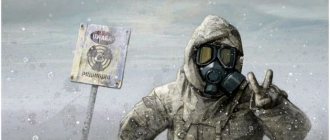Why the end of the world might really be coming
And yet, over the past decades, researchers have put nuclear disaster at the top of the list of reasons that can lead to the death of humanity. It is not for nothing that for the second year in a row the Doomsday Clock - a project of the American magazine Bulletin of the Atomic Scientists, reflecting the level of danger of an approaching nuclear catastrophe - shows two minutes to midnight, and the world's stockpiles of nuclear weapons are still alarmingly huge.
Doomsday Clock
Another group of popular apocalyptic theories assigns a major role in the upcoming end of the world to various cosmic objects and phenomena. Moreover, if the predictions of the death of the Earth under the influence of the mythical planet Nibiru, so beloved by conspiracy theorists, only make most people smile, then a collision with some astronomical object is purely hypothetically quite real.
In particular, according to scientists from St. Petersburg State University, in 2068, asteroid (99942) Apophis may collide with our planet. No less hypothetical danger for the Earth is the possibility of falling under the jet of a nearby gamma-ray burst.
In addition, the end of the world - or at least human civilization - could theoretically be caused by natural disasters, a global pandemic, overpopulation and associated famine, a supervolcano eruption and much more, so more and more people are beginning to seriously prepare for the apocalypse.
You can see how they do this in the program “Craftsmen Against the Apocalypse,” which will air in August on the Discovery Channel.
“How to survive after the apocalypse? The main thing is not to forget the head!”
Along the Moscow underground rivers you can not only move between districts of the city, but also get outside the Moscow Ring Road.
Photo: Ivan VISLOV
Some people kill zombies in a computer shooter in their free time, others kick a ball around in the yard. And some are preparing for the apocalypse. There are quite a few closed groups of so-called survivalists on social networks. These are people who arrange caches with food and look after the life in remote villages near Moscow in case of emergency... Crazy sectarians? Unlikely. In any case, the guys look quite healthy. Even too much.
There are hundreds of groups on social networks where survivalists hang out. In one of them I met Grisha. A stern guy of about 25 years old, he speaks like a military man: clearly and to the point.
- Take boots, simpler clothes and woolen socks, we’ll climb near Moscow. I'll show you how our group will get out of the city in the event of a BP.
- What?!
- Big... (we cannot publish the second word in the abbreviation, since it is obscene. A synonym for the expression “the end of everything”).
We meet at a metro station in the south of Moscow. It turns out that Grisha is a business coach by profession and gives lectures. And in his free time he runs the “Ready to Survive” project. It has been surviving for about ten years. We wander through the narrow streets for ten minutes. Near a river hidden behind the trees, Grisha takes out wades (rubber overalls like those for fishing), flashlights, and rope from his backpacks.
"FOR THE PARTY"
- Let's go along the bed of the underground river. Don’t write the name so that onlookers don’t climb,” warns Grisha.
Somehow I get into my waterproof suit. The river goes into a concrete collector. The water is knee-deep, but going against the current is not easy.
“In this place we conduct our trainings in full gear,” the guide explains to me. - By the way, there are several waterfalls ahead of us!
But the day started out so well... If something happened, they would catch you in the sewer only after a few kilometers. And it’s not a fact that he’s in good health.
It's hot in the concrete pipe. The water is noisy, you have to shout to hear each other. Some brown formations are flowing from the walls. Grigory consoles us that it is simply washing away all sorts of minerals from the soil.
There is a wide highway above us. Passing cars knock somewhere above on the manhole cover. Let's walk another couple of hundred meters - the arrows of the railway tracks will go over the river.
“Each group has a core, people you can rely on,” Grisha says along the way. — I have about a dozen of these. Many come for the party and quickly leave.
UKRAINIAN LESSONS
— Who thought at the beginning of the year that a real civil war would begin in Ukraine? - Grisha thinks. — We can say that they now have a local power supply.
— What is global? Nuclear war?
Grisha waves his head:
— The worst thing for a person is the collapse of infrastructure. If the electricity is turned off, there will be no civilization. What if it happens in winter? Bam - and the houses were left without light and heat. At 20 degrees below zero, an apartment building will freeze out within five hours. Due to the temperature change, the pipes will burst to hell, there will be no more water...
We are standing at the waterfall. Everything is serious here - about five meters high. It can be seen that the concrete beams above our heads are broken by water, the reinforcement veins are exposed. Impressive.
— The guys and I climbed here with climbing equipment. I even lost it once,” Grisha critically examines our fords. - The equipment is not the same. Let's go back.
Judging by the maps, after 3 kilometers the river comes out beyond the Moscow Ring Road. Preppers are confident that in the event of a global emergency, the city will become a trap. The chances of survival are much greater in pre-prepared bases - houses in villages that are bought together for pennies. A fortified basement bunker is being installed there. It stores and replenishes provisions to feed families for 2 to 3 months. Preppers refuse to show such caches. Deep secrecy.
SURVIVAL BUSINESS
To whom is war, and to whom mother is dear. Survival is becoming a good business. There are groups on social networks with 80–100 thousand subscribers. An entire industry has formed around them, with a thriving trade in survival kits and accessories. And all this costs a lot of money. They sell tents (from 4500), sleeping bags (from 3000), dry rations (from 500), folding knives (average price - about 1500 rubles), flashlights (900). And also backpacks, walkie-talkies, generators. Analogs can be bought 3-5 times cheaper. But everything here is branded, with bright logos. And when visitors ask the question head-on: “Why is it so expensive?” - they are answered: “But this is exactly what you need to survive!”
“The question of how much the equipment should cost is an idle one,” Grisha asserts, laying out the simple contents of the backpack in front of me. “Personally, a knife and a lighter would be enough for me at first.” But for serious preparation, you need at least a first aid kit, a fishing kit, a flashlight, a compass, and a plastic water bottle in your backpack. By the way, you can make a primitive water filter from it and a bandage - you will have to drink all sorts of nasty things after BP. But the main thing is not to forget the head.
Needless to say, many people are wary of preppers. They say that people are doing nonsense. And in general, they are kind of strange: caches, knives, camouflage.
“Preppers are not a problem, they are a solution to a problem,” Gregory shrugs. — The BP will end sooner or later. When the time comes to restore the destroyed world, it is they, the survivors, who will take on the most difficult, dirtiest work. They will become the core around which civilization will rally.
AND THERE WAS A CASE
A city dweller lived alone for six months in the “tenth century”
Muscovite Pavel Sapozhnikov and his friends conducted a risky experiment on themselves last year. In the forest near Sergiev Posad, they built a log house for him, stocked up on food, and, as part of the “Alone in the Past” project, left him to live according to the rules of Ancient Rus' of the 10th century. Just him, a few chickens and goats. No gadgets, TV or refrigerator. Linen clothing, wooden tools. Rigid subsistence farming, like a thousand years ago. For the purity of the experiment, Pavel was not allowed to communicate with anyone or accept anyone’s help. After all, this is roughly how survivalists imagine the world after the apocalypse. The experiment lasted from September 2013 until the end of March 2014. During this time, the guy lost more than 20 kg of weight.
“I worked on historical reconstructions for several years, lived for a long time outdoors in camps,” says Pavel. “But there were many moments that I imagined differently before the project. For example, I thought there would be a lot more hassle with pets.
“You tried to hunt with a bow.” Did it work?
- In general, it is believed that I shoot a bow quite well. But this is at “knightly tournaments”. But on a real hunt, try to hit the hare from at least 30 meters away, you can’t get any closer. For myself, I found out one thing: it is more effective to hunt by setting snares. I tried to eat foraging - berries, mushrooms.
— You lived for six months in a world without electricity and technology. Was it difficult to get used to this?
— Our ancestors somehow managed without refrigerators. Salt and honey are the best preservatives; you can prepare both meat and fish in them. And it was not so difficult for me psychologically to go into the world of the 10th century as to return from it. And there, in Ancient Rus', what I missed most was music, not social networks.
Survive after the apocalypse...
The KP correspondent met the survivalists - the guys who are waiting for the apocalypse
There are different types of preppers
Two years ago, The New Yorker wrote about an interesting trend: more and more super-rich people in the United States are preparing for the end of the world - including co-founder and CEO of Reddit Steve Huffman, former Facebook product manager Antonio Garcia Martinez, director of the Mayfield Fund venture investment fund Tim Chang and many others.
In case of an apocalypse, all these wealthy people take survival lessons, stock up on weapons and ammunition, as well as food and water, invest in the construction of high-tech bunkers and purchase real estate in the safest regions (with New Zealand being the most popular among them).
However, today it is not only those who have a lot of money who are preparing for the apocalypse. In the West, this is a whole subculture that calls itself preppers (from the English prepare - “to prepare”). Preppers, as the name suggests, make various preparations in case of a large-scale disaster: they build bunkers, buy mobile homes, generators, weapons, and make strategic reserves that will help them survive in a post-apocalyptic world.
Another survival movement is bushcrafters, who are able to survive in any wild natural conditions thanks to their knowledge and skills (for example, the ability to make a fire without matches, assemble a hut, distinguish edible mushrooms and plants from inedible ones and cook them). There are other categories of preppers, and many of them practice a combination of different approaches.
If you are also close to apocalyptic sentiments and want to increase your chances of survival in the event of the end of the world, we suggest that you familiarize yourself with the following tips. It is clear that they will not save you from a total catastrophe that will destroy all life on Earth, but in other cases they may well be useful.
Hollywood lied to us about the walking dead. Math can help you survive the zombie apocalypse
Popular culture - films, comics and TV series - has already taught us how to fight the living dead and survive in the zombie apocalypse. But then mathematicians found out that all these methods are meaningless and useless. If you try to kill zombies, especially en masse - for example, by involving the armed forces - then the only thing humanity will get is rapid extinction. And all because it’s not easy to destroy zombies. There will be many human victims, and they will all join the ranks of the walking dead. And here, as always, progress and intelligence will come to the rescue.
More details
Scientists believe that the only effective solution during a zombie apocalypse would be to neutralize and tame individual zombies so that they cannot spread the infection. When exploring the issue of potential infection of the walking dead, scientists used the same models and approaches as for studying real infections. The vaccine works best for them because it stops the spread of the disease.
To popularize their research, scientists even filmed a mini-instruction manual on possible tactics for fighting zombies. “Using mathematics, we can determine how many people we need to vaccinate to stop the spread of the disease,” the scientists write.
The team wanted to show that a person can integrate zombies into society - to create non-aggressive and non-infectious living dead who can even work as they did during life. Scientists believe that a vaccine that neutralizes infection can be transmitted in the same way as the infection itself. And then humanity will be saved.
Behavioral models developed by scientists can explain real-world data, make predictions about future disease outbreaks or controls, and better understand natural habitats.”
Human experiment
The researchers decided to present a live version of their project at the Green Man 2021 music festival in South Wales in order to visually confirm the results of the work. To simulate an outbreak of a zombie infection, that is, the beginning of a zombie apocalypse, the team offered one person—Patient Zero—armbands to hand out and mark visitors. I received a bandage and became a “walker.”
More details
The “infected”, having received their armband, could learn more about the project and receive armbands right during the festival in order to also take on the function of spreading the infection. By the end of the fourth day of the festival, more than 2,000 people had been turned into zombies, the team said.
“In this project we used a fun, familiar concept to present real-life disease research taking place at the University of Sheffield. We hope that the project we have presented will reveal the exciting possibilities of mathematics and help dispel fears of the world being taken over by the undead,” said team member and mathematician Fay Frost.
Tip #1: Take care of food and water
It is logical that first of all you need to take care of food and water supplies. If everything is clear with water - the more liters you have, the better - then when preparing provisions for an emergency, you need to take into account certain nuances.
It is extremely important to stock exactly those products that can be stored for a long time without refrigeration, and it is better to keep them in the dark, preferably in airtight packaging, while avoiding changes in temperature and humidity in the room where you decide to hide them.
First of all, you will need to purchase cereals - it is advisable to give preference to buckwheat, which is stored for a long time and at the same time contains a lot of protein, as well as a variety of vitamins and minerals. In a post-apocalyptic world, it will also be convenient because it does not have to be boiled: just pour hot or even cold water for a while. In addition, you can stock up on protein-rich barley and wheat, as well as oats and rice (but the latter two grains do not last as long, so you should eat them first).
You should also send lentils and dry beans, canned meat and fish with a long shelf life, tomato paste in a glass jar, refined olive oil, honey to the pantry or what replaces it (it is not only able to satisfy the need for sweets and is stored for a long time, but also helps in the fight against bacteria, including antibiotic-resistant ones).
It is better to divide food supplies into several parts so that in case of an outing you can take a balanced portion with you.
Set up a settlement
Written requests for help can attract other survivors to you (Dawn of the Dead movie). But do you really need it?
Make sure your shelter has secure doors and latches. Make thick curtains on the windows so that light does not penetrate from them at night (just in case, remember that a 100-watt light bulb covered with three-millimeter plywood is detected by a night vision device from a distance of 1 kilometer). Give the surrounding area an abandoned look. Eliminate all high places that can be used to climb onto your roof or climb over a wall. Dedicate several people to guard the shelter around the clock, and organize increased vigils at night.
In the dark, a simple “alarm” would be useful - ropes with cans and bottles, strung on the approaches to the shelter. Keep fire extinguishers ready (powder extinguishers are best). Traps and traps placed outside can protect you as well as rifles, and a tree fallen on the road can prevent a sudden “cavalry charge” of enemy vehicles. All adults must be armed with at least a bladed weapon.
In most cases, your first shelter will be just a transit point. Stock up on what you need, get used to life in conditions of natural selection, learn to shoot. Before the situation escalates to the limit, you should have time to scout out a place suitable for permanent habitation: 25-30 kilometers or more (daily travel distance) from cities and towns, industrial facilities, dangerous landscapes - places of avalanches or mudflows, earthquakes, floods, but close to running water bodies and large forested areas.
Gasoline and diesel generators will provide you with electricity, consuming about a liter of fuel per hour
Food supplies will melt before our eyes, so the first thing that needs to be done after ensuring the safety of the settlement is to create a normal agricultural base (and not tomato plantations, as in the film “The Reign of Fire”), organize the collection of gifts of nature - including medicinal plants, and try to breed pets.
There is no point in establishing trade (in-kind exchange), as in the finale of Heinlein’s Freehold of Farnham. The benefits of this are unlikely to justify the risk of attracting unhealthy attention to your refuge. It is reasonable to establish a foothold in a city for several seasons only if there is at least some hope of normalization of the situation. The food and fuel resources of a city suffering a humanitarian catastrophe will quickly come to an end, and it is impossible to hide from danger forever.
Tip #2: Prepare a Post-Apocalyptic Wardrobe
The likelihood of survival in a post-apocalyptic world will be significantly increased by suitable clothing and shoes. The ideal option would be an all-season field uniform set (VKPO) - it is also known as an all-season basic uniform set (VKBO), but journalists simply nicknamed it “cabbage” (because of its eight layers).
It includes 23 wardrobe items, including three pairs of shoes, and combining them allows you to use “cabbage” in a variety of conditions - in heat, rain, wind, frost (down to minus 40˚C) and during intense physical activity. Of course, it is very durable, and when folded it is also quite compact. In addition, since March 2014 in Russia you can buy a version of VKPO adapted for civilians.
All-season field uniform kit (VKPO)
If for some reason you cannot or do not want to buy “cabbage” when collecting your wardrobe for Day X, remember the basic requirements that it meets. You need to get the most durable clothing that protects well from wind, moisture and other vagaries of nature and environmental conditions.
In addition, it should be comfortable (no tight jeans that restrict movement), fairly closed (it is much easier to get abrasions and wounds in shorts than in pants), and having a large number of pockets will also be a plus.
The same requirements (except perhaps for pockets) apply to shoes. It is also desirable that it be resistant to aggressive environments in case you have to run through spilled fuel or chemicals. Safety footwear is a great option.
Thesis two
In their anticipation of the last days, Christians always focus not on the horrors to come, but on who exactly is coming to them. In other words, they wait for Christ and are not afraid of death.
If you try to impartially understand why modern people are so afraid of the end of the world, the answer to this question will come down to two points - the fear of death and the fear of leaving their comfort zone. Both motives are, in fact, not new; the Church has encountered them throughout its history. Therefore, it is worth looking at how previous generations of Christians responded to similar challenges.
The first serious test for the Church was persecution by Palestinian Jewish leaders, who viewed the followers of Jesus Christ, whom they crucified, as a heretical community. Their main complaint concerned precisely the veneration of the Savior - for the zealots of the Law of Moses, Jesus the Galilean was a violator of fatherly traditions. The Jews were ready to recognize Christians’ right to exist as one of the sects, but they flatly refused to recognize the Divinity of the Lord. As a result, many Jewish Christian converts paid for their faith with social status - they were expelled from their communities, subjected to ridicule, and deprived of contact with relatives. The most persistent and active Christians were stoned to death. But the majority of those persecuted deliberately went through hardships, because the faith they had acquired in Christ was much more valuable than all worldly goods. Christ Himself and the connection with Him were dear to them. And against this background everything faded - even pain, suffering and death.
With the emergence of the gospel sermon on the world stage, the previous conflict was repeated - it was very difficult for the pagan world to understand the categorical nature of the followers of Jesus. Unlike the Jews, the Romans and Greeks were quite tolerant of the idea that Christ is God, since they themselves professed polytheism. The Palestinian Preacher fit well into their pantheon and could take a place between Asclepius, Hercules and, for example, Isis. But in response to such tolerance, paganism demanded that Christians recognize all the other deities with which the myths of the peoples of the world were filled. Naturally, believers, for whom there has always been only one God in three Persons - Father, Son and Holy Spirit - refused to compromise. And absolutely, as was the case with the Jews, they were ready to lose all earthly goods and even life itself, just to remain faithful to the One Whom they had once accepted with all their hearts. As the Apostle Paul put it, “To me to live is Christ, and to die is gain” (Phil. 1:21).
These words are very dear to Christians. Yes, man by nature is afraid of suffering. And even many saints asked God not to give them tests beyond the measure that would be critical for them. Nevertheless, for people who are firm in their faith, leaving their comfort zone (no matter what it was - everyday, social, emotional) was not a reason for fear, because they were truly comfortable only with Christ. A parallel is appropriate here with thousands of cases of self-sacrifice in war, when in the name of saving their native land and for the sake of their beloved wives and children, soldiers went into battle with the enemy and were ready to give their lives.
This is because this kind of behavior is always motivated. The main motivation of Christians is eternal life with their Savior, and this is not just a motivation, but the essence of all existence. The saints were not afraid of losing earthly goods because they were not attached to them. And frightening them with deprivation was as pointless as punishing an adult youth with a ban on watching cartoons for children. Showing with their own lives an example of complete adherence to God, ascetics and other believers call for an appropriate alignment of values.
What about death? After all, for the average person, the fear of dying is one of the very compelling reasons not to want to live during the apocalypse. The fact is that theology draws a clear line between the concepts of death and non-existence. At first glance, these states are very similar, because both are directly related to decay, decomposition and destruction. But there is one fundamental difference between them.
Non-existence is the original point of existence of all God's creation. Even the angels - including Lucifer - have a beginning and are called out of oblivion by God's will. Only God has true existence. He Himself, if we adhere to the exact dogmatic formulations, is the True Being, its Source and Giver. It is possible to live fully and harmoniously only through participation in Him. And, conversely, the more a person moves away from the Creator, the more he plunges into the abyss of non-existence. This process is endless, because any person - be it a person or an angel - is immortal. This kind of eternal dying is the worst thing that can happen to God's creation. Demons already live in this state, and after the general resurrection, everyone who has not accepted Christ as God and Savior will also find themselves in it - and voluntarily. Saint Theophan the Recluse wrote about such a voluntary choice of hell:
“When passions are expelled from the heart during earthly life and virtues that are opposite to them are implanted, then whatever lovely thing you imagine, the soul, which has no sympathy for it, passes it by, turning away from it with disgust. And when the heart is not cleansed, then for which passion it most sympathizes, that’s why the soul rushes there. The demons take her as if they were friends, and then they know where to put her. This means that it is very doubtful that the soul, while it still has sympathies for the objects of any passions, will not be ashamed at the ordeal. The shame here is that the soul itself is thrown into hell.”
But Christians should not be afraid of death in its usual understanding - as the cessation of biological functions. Of course, our entire nature resists it, because it was not originally conceived by God and entered into human nature after the fall of the first people. But for all its horror, church tradition sees two positive aspects in it.
Firstly, death is a gift from God, no less valuable for a person than life itself. In paradise, our forefather not only violated the commandment and suffered a well-deserved punishment - he also received a certain “centrifugal impulse,” “inertia of sin,” which inexorably removes him from the Creator. Surely many have noticed how difficult it is, for example, to refrain from shopping at the supermarket if you know that you have enough money in your wallet. And, conversely, if there are few of them, then the risk of purchasing something unnecessary or unreasonably expensive is minimized. In the situation with death, something similar happens - it forces a person to constantly remember real meanings in the conditions of fast-paced earthly life.
Thus, Saint Cyril of Alexandria wrote:
“By death the Lawgiver stopped the spread of sin, and in the very punishment he reveals His love for humanity. Since He, giving the commandment, connected death with its crime, and since the criminal fell under punishment, He decreed that the punishment itself could serve for salvation. For death dissolves our animal nature and thus, on the one hand, stops the action of evil, and on the other, it saves a person from illness, frees him from work, puts an end to his sorrows and worries and ends his bodily suffering. To such love for humanity the Judge added punishment.”
Secondly, death should not frighten a believer, since Christ also passed through it. And he didn’t just pass through, but made it the very door through which we will all enter a new life. The Savior did not cancel it, and it remained the same inevitable finale as it was before the Incarnation of the Son of God. But at the same time, the Lord filled death with new meaning. It is appointed for men to die once (Heb. 9:27). Therefore, dear Anna, if you believe in God and try to live according to His commandments, then the main thing you need to focus your efforts on is finding inner peace and tranquility through trust in God and His love for us. It is not so important for what reason a person’s earthly life ends, but what is of great importance is what it was filled with right up to the last minute - panic and despair or gratitude and firm conviction of a quick meeting with the beloved Savior and with those who have already tasted death.
Another thing is that it is quite difficult to achieve such a harmonious state when deprivation and death cease to be a cause of fear. Especially now - against the backdrop of increased information noise created by the media, and the hedonistic lifestyle to which modern society teaches us. And here it is important to understand one more fundamental thing.
Tip #3: Build a Survkit
If civilization does collapse, your chances of surviving will depend not only on the provisions you have and what you are wearing, but also on what kind of survival kit - or survival kit - you will be able to collect by that time .
Survivors prefer to store a significant part of the things from this set in a spacious, durable and convenient backpack, so finding or purchasing one is where you should start preparing your survival kit.
The first thing you should do in your backpack is to put the following seemingly ordinary things that can be very useful in extreme conditions: a rope, several large garbage bags (each of them is a raincoat, a canopy and a bag for new supplies in one) and small disposable bags (in addition to storing various things in them, you can put them on your feet under your shoes so as not to get them wet), tape (allows you to fix almost anything).
Prepper kit
Don't forget also a roll of foil (helps protect things from getting wet, keeps food warm, easily takes any shape), superglue, wire, needles and threads, lip balm (accelerates the healing of small wounds), liquid disinfectant, candles, matches (preferably hunting ones) burn longer than usual and are more resistant to changes in temperature and humidity), a pocket mirror, a stainless steel flask and thermos, a towel, handkerchiefs, a pencil and a tear-off notepad.
The next category of things are items that are often useful on long hikes: a mini-compass, a sleeping bag, binoculars, a flashlight with extra batteries, a homemade torch, a shockproof waterproof watch, disinfectant tablets for water purification.
In addition, you should not forget about a first aid kit with antiseptics, painkillers, antibiotics for external use, remedies for cramps, indigestion, colds, allergies, bandages, plasters, a hemostatic tourniquet and anti-burn cream.
A separate item should be highlighted weapons and tools that are useful for hunting, self-defense and much more. First of all, you should get a good folding knife, or better yet, two or three, just in case, as well as a multitool, which combines a blade, an awl, a screwdriver, an opener and other useful hand tools, depending on the modification.
Survival in the wild requires larger tools, such as a machete and an axe, which can be used for clearing terrain, chopping wood, and even building temporary shelter. A crossbow will help in hunting large animals: although this is a rather ancient weapon, in an apocalypse it will be very relevant due to its power, accuracy and noiselessness.
Moreover, some ancient models are not inferior to, and often superior to, modern factory analogues. By the way, the crossbow is far from the only ancient invention that could come in handy if modern civilization collapses: there are many other vintage mechanisms that are ready to help their owners survive the end of the world.
A team of Tennessee engineers led by mechanic Bo Boraff finds them, restores them to working condition and sells them to those preparing to survive the disaster. You can also learn more about their work in the program “Crafts Against the Apocalypse,” which will air in August on the Discovery Channel.
Tip #4: Think about what you will be driving on
Everything is simple here. Although many cars and other vehicles designed for extreme conditions have been produced in recent years, many of them are quite expensive and also require high fuel consumption. When, in a couple or several years, the fuel reserves for many kilometers around come to an end, they will be useless, and the bicycle will become the king of the roads and trails.
Fragment of the TV show “Craftsmen Against the Apocalypse” on the Discovery Channel / ©Discovery Channel Press Service
In the end, you can get to the desired destination faster than on foot, and it allows you to transport a certain amount of cargo, so it’s also better to prepare the bike in advance (of course, you need to choose a high-quality and most versatile model). However, a personal car will also serve you well in the first years - it is only advisable that it does not use very much gasoline (you will also have to take care of its reserves).
Tip #5: Prepare a Shelter
Surviving in extreme conditions is much easier if you have a reliable shelter equipped with everything you need. You can, of course, strengthen and prepare your house, but in the event of, for example, natural disasters, it could simply be demolished, and there is a possibility that it will attract the attention of looters, so a secret bunker would be a more reliable option.
If you have your own plot and you decide to build an underground shelter there, first of all you will need to find out whether any centralized communications are laid under your territory, and at what level the groundwater lies - in this case you need to build a bunker at least 50 centimeters above them.
A fragment of the TV show “Craftsmen Against the Apocalypse” on the Discovery Channel. The completed bunker is visible / ©Discovery Channel Press Service
It is better to arrange a shelter not under the house itself, but at some distance from it, otherwise if the main dwelling collapses, the exit from the bunker may be blocked (by the way, do not forget to camouflage it).
The design and equipment of the bunker depends entirely on your financial capabilities. A budget-friendly and at the same time durable option would be a container for a septic tank buried in the ground made of impact-resistant plastic, from which two pipes are laid on the surface to provide ventilation, and to protect them from dust, you can make filters from fiberglass and gauze.
Of course, this option is still more suitable for short-term stays. A more substantial shelter will require larger investments and more complex engineering solutions - when building it, you will most likely have to turn to specialists. Key points: a bunker for long-term accommodation must be equipped with an energy generator, a ventilation system, a dry closet, an emergency exit, a sealed hatch door and a ladder for descent.
You can never rule out the possibility that in a post-apocalyptic world something will happen to your shelter - no matter how safe and well hidden it may be - or you will have to leave it due to unforeseen circumstances. Therefore, it doesn’t hurt to also get a durable tent that will protect you from any bad weather, preferably with a warm inner awning.
Tip #6: Gather Information and Gain Skills
No matter what excellent bunker you build for yourself, no matter what supplies and equipment you prepare, in a post-apocalyptic world in the long run you may lose all of this. How to survive further? Only knowledge and skills will help you here, and it’s better to start acquiring them in advance.
By reading books and articles, watching educational videos and attending special classes, you will learn, for example, that brewed spruce needles contain as much vitamin C as a glass of orange juice, and acorns are rich in fat, but they only need to be boiled for two hours to get rid of bitter taste.
You can make coffee from acorns
You will also learn to recognize edible insects, mushrooms and plants, obtain and store seeds and grow edible crops from them, disinfect water, start a fire, build traps for rabbits, and navigate the area. You can also start learning in your free time some profession or craft that will be valued in a post-apocalyptic world - for example, an agronomist or a blacksmith.
Of course, it is better for the most important information to be stored not only in your head, but also on other media - analog, of course: in notes, encyclopedias, reference books and maps.










